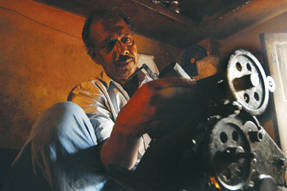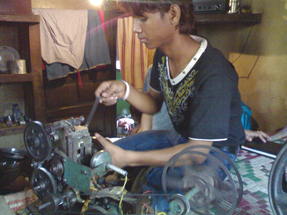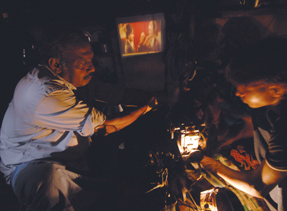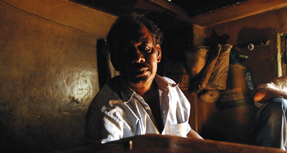Arts
The Last Bioscopewallah
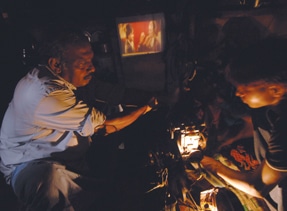
Mohammad Salim is so enamored with his bioscope that he sails by life oblivious to the grievances he could pick with it.
|
Bioscopewallah……bioscopewallah ayah….aao, dekho,nai purani filme sirf ek rupiya. (Here comes the Bioscopewallah, come and watch new and old films for just Re 1).
The throw-back cry from the 1960s and 1970s of Indian street vendors trying to lure children and adults to the magic of movies in a box still reverberates in the serpentine bylanes of Kolkata, mingled with the smell of moss and decay. The cry might not have the same verve, nor perhaps does it elicit the earlier enthusiasm. But it still attracts curious onlookers who crowd around as the last bioscopewallah of Kolkata sets up his shop near a school or a movie theater.
Children rush to his cart, clutching a rupee coin in their hands. Some older people might still remember the voyeuristic feeling of peek-a-boo cinema under the shade of the ominously grave-looking black cloth, but most have either forgotten or never experienced the charm of the movie in the wooden box. Mohammad Salim, with his 100-year-old projector, is a relic from a forgotten era. He roams the streets of Kolkata, letting people experience in short bursts the often surreal world of the bioscope. Salim’s voice has become weaker with age, but the enthusiasm remains undimmed. He is the thin string that binds Kolkata with its glorious past to the beginning of cinema — the Royal Bioscope Company, India’s first bioscope company. Salim is not only oblivious to the legacy he has carried on his shoulders for decades now, but he is equally nonchalant about his brush with international fame, which includes an Oscar nominated documentary on his life. He only understands his bioscope and beyond it everything else pales. Salim’s journey on the Kolkata streets with his bioscope began more than 40 years ago. In his late fifties, he laboriously pushes along his archaic projector on a hand driven cart. These days often he is accompanied by one of his unwilling sons, for whom the bioscope holds no magic. Sometimes he is mistaken for an ice cream vendor, most times he is ignored. In this digital age, the wooden bioscope holds no attraction and Salim cuts a lone figure as he wanders from one street to another. However, as he sets shop and Bollywood music and dialogs burst forth from his bioscope, a small crowd gathers around him; a crowd that wants to lose itself in the garish, colorful, melodramatic and musical world of Bollywood movies. The glamour, thrill, drama and dreams of Bollywood are packed into three-four minutes of trailers that transport the viewer into a makeshift world of the movies — short lived, but an escape from the real world nevertheless.
Salim was initiated into the trade by his father Mohammad Khalil at age 12. As a child the machine intrigued him, especially when he put his eyes onto the snout and witnessed the euphoric burst on the screen — a Bollywood scene, a hit dialog or a feet tapping song. For 12-year-old Salim it was a magic box, an alternative life of merriment. After his father died in 1970, Salim took over the title of the Bioscopewallah. He was 18. Today in his late fifties, he loves his trade, even though it doesn’t make him as much money as he would like to run his family. He loves pushing the cart from one street to another, because it gives him the “opportunity to meet various kinds of people.” Salim loves talking to his customers. “People’s lives have always fascinated me. I love talking to strangers and knowing about their lives.” In the 1960s and 1970s the call of the bioscopewallah was eagerly awaited in the neighborhoods of Kolkata. However in this age of television and computers, the bioscope is as antiquated as the term itself. Salim recalls the golden days when his father’s bioscope ruled the roost: “When my father used to call out, people used to come rushing out of their houses, especially children and women. They used to stand in the balcony for hours in order to catch the bioscopewallah.”
Tracking down Salim in Kalabagan, the huge slum in which he lives, is challenging. However, as soon as the query moves from “Salim” to “the man who shows movies in his hand cart,” this reporter made some headway. Following complicated directions, Salim’s house turns out to be in a maze of lanes and bylanes in the slum. The narrow bylanes are filthy with scattered rubbish from surrounding houses. The ground beneath is slippery with moss and splotchy with smelly puddles. Then it is a precarious walk up 5 flights to Salim’s home. The building is old, but half finished, the stairs are steep and narrow. Fish and meat bones are scattered around, along with vegetable peels. Outside Salim’s room, the door is blocked — the room is too small to allow for cooking, so the makeshift kitchen is right at the entrance to the room. Delicious smell of mutton cooking in spicy gravy wafted through the air, interrupted by the shrill whistle of the pressure cooker and the monotonous sound of vegetables being peeled and cut. Inside the room, a cement slab works as the bed. Beneath the bed is a makeshift store that at night serves as a room for his children. Salim sat half lying in his checkered lungi and vest. He is heavily built, with a prominent paunch and a ring of white hair that surrounds his bald pate. His life is as removed from the Bollywood dreams he spins out of his box as fantasy is from reality. He is a nondescript man until he starts his projector and the films roll out and he transforms into a sorcerer from the past, weaving and doling out Bollywood dreams in small packages.
Salim’s home is a tin box measuring 6 feet by 12 feet. He lives there stuffed and roasted with his wife and six children. They sleep, cook and live in that space day in and day out. Salim’s highest earning is around Rs 500 ($10) a day when he plays to the gallery in fun fairs or shows at private parties. On typical days he earns around Rs 100 ($2). “I used to earn around 200-250 a day. Till today my charges are the same — Re 1 for watching my bioscope. The charm of the bioscope is still very popular in fun fairs and there I sometimes earn up to Rs.500 a day as there is no competition. I am the only one who stands in the corner with my bioscope,” Salim say, although he is not happy that he is the only one left. When he accompanied his father on his rounds of the streets, there were many other bioscopewallahs. They showed silent pictures as the bioscope was not equipped for sound. However, Salim recalls that in those days, “People were mesmerized by the picture. They didn’t need sounds or songs.” However, times changed and most bioscopewallahs went out of business as it wasn’t profitable. Salim also tried his hands at other trades, but he kept returning to his passion. On Sundays Salim can be seen setting up shop near popular movie theaters. A crowd gathers around him slowly. Ravi Verma, a spectator, takes a good look at his projector and proclaims that Salim is an engineer. “This machine is simply amazing,” he tells Salim, who beams with proprietorial pride. Verma says, “This takes me back to my childhood, when we used to run out at the sound of the bioscopewallah. It’s a different feeling taking a peek inside this box. You cannot compare it to watching a movie in the theater.” Sipra Sen, a 22-year-old college student is seeing the bioscope for the first time in her life. She says excitedly: “I have heard about the bioscope, but this is the first time I am actually seeing one. I thought they went obsolete long time back.” The crowd that had just emerged from watching a full fledged movie didn’t seem discouraged — and Salim was only too happy to oblige. Salim survives in an age dominated by iPods and DVDs by updating his equipment to keep pace with the modern age. His passion with the bioscope led him to experiment with it and add new features. The original bioscope had no provision for sound so Salim, realizing he will lose his audiences if he failed to add it to his trailers, acquired sound. “I love my projector and the fact that this small box contains all the wonders of a cinema hall. And I told myself, there must be a way to put sound too! I went to the cinema halls and asked people about how they put the sound on the lip movements. We tried to replicate that in my projector and succeeded. It was because I went with the times that I have been able to keep this alive. If there was no sound, no one would have watched it anymore.”
Salim is a one-man army: from editor to mechanic, he is the only reference point. Over the years he has learnt how to repair the machine. Sometimes, when a part of the machine breaks down, he has it replicated by a hammer smith. His hard work is rewarded when he sees a crowd build around him and his machine on the streets. He refuses to acknowledge that the appeal of the bioscope is limited now and argues that people still love to watch his films. “When my cart comes in sight people just come running. I don’t have to call anyone. I go out only twice a week now because of ill health. I go out at 12 pm and return around 4-5 pm and sometimes if the party gets going then I return late in the night. Despite the popularity of television and videos, people still want to come and see my films, because they can see it as many times as they want. They also request us to show the trailers of certain film stars. No one likes to see one movie over and over again; all they want is to see some good scenes and the songs and that’s what I give them.” Despite brief spurts of anger when he wants to abandon his bioscope, he always comes back to it because he finds it less a trade and more his vocation. “I can’t relinquish my heritage. It’s true that I didn’t do well in life, but it is also true that I have got recognition in the world through this bioscope only. People know about me and they respect me for my work and that means much more to me than making money.” Salim Baba, a documentary that captured his four decade journey, was nominated for the Oscars in 2008 in the short documentary section. American filmmakers Tim Sternberg and Francisco Bello portrayed Salim as the link between the initiation of cinema and the modern era of digital cinema. However, Salim says he was not even aware that the duo was shooting his life, nor that the documentary was nominated for the, nor for that matter did he even know what the Oscars were. Pretty ironic for a man who unknown to himself is the last link to the origins of cinema. “I am poor so many people try to take advantage of me,” he muses. The era of the bioscope will likely end with Salim. His sons are not interested in carrying forward the tradition of their father and grandfather. They are young men who have come of age in the digital era of mobile phones and computer games. Incredible sentiments from a man who barely ekes out a hand to mouth existence, cramped in a small room in a filthy slum in Kolkata. But that is the flavor of Salim Baba. He is so enamored with his bioscope that he sails by life oblivious to the grievances he could pick with it. |

